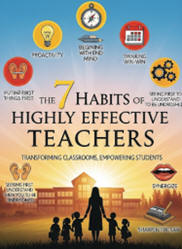|
|
||
|
The 7 Habits of
Highly Effective Teachers
In the dynamic and often demanding world of South African education, finding ways to move beyond survival and towards real impact is essential. Our work as teachers is not only about academic success, but also about shaping future citizens who can contribute meaningfully to the country's growth and development. Many readers will be familiar with Stephen Covey's renowned book, The 7 Habits of Highly Effective People. Although originally written with business professionals in mind, its principles are equally applicable to the teaching profession. Below, we explore how these habits can guide us as South African educators striving for excellence in the classroom and beyond. Habit 1: Be Proactive - Taking Initiative in Our Classrooms In the South African schooling landscape, challenges are a given - resource constraints, diverse learning needs, societal pressures. Being proactive means not waiting for perfect conditions or directives from above. It's about taking ownership. Instead of saying, "If only we had more textbooks," a proactive teacher says, "How can I use the resources I have creatively to achieve my learning objectives?" It's about identifying a problem in your classroom - perhaps a dip in literacy levels - and proactively seeking solutions, whether it's developing your own reading materials, collaborating with colleagues, or tapping into online resources. It's about being the driver, not just a passenger, in your professional journey. Habit 2: Begin with the End in Mind - Vision-Driven Teaching What kind of citizen do you want your learners to be when they leave your classroom, or indeed, when they leave school? This habit encourages us to start each lesson, each term, each year, with a clear vision of the desired outcome. For us in South Africa, this isn't just about academic results. It's about nurturing critical thinkers, problem-solvers, empathetic individuals, and responsible citizens who can contribute meaningfully to our rainbow nation. When planning, ask yourself: "What skills, knowledge, and values do I want my learners to embody by the end of this?" This clarity of purpose will guide your teaching methods, assessments, and interactions. Habit 3: Put First Things First - Prioritising Impact With packed curricula, administrative tasks, extra-mural activities, and sometimes even social challenges spilling into the classroom, it's easy to feel overwhelmed. "Put First Things First" is about effective time management and prioritisation, focusing on what truly matters. This means dedicating your prime energy to preparing engaging lessons, providing meaningful feedback, and building positive relationships with your learners. It's about distinguishing between urgent and important tasks. While filling out forms might be urgent, fostering a love for learning in a struggling student is undeniably important. In a context where every minute counts, this habit helps us maximise our impact. Habit 4: Think Win-Win - Collaborative Education Our education system thrives on collaboration. Thinking "Win-Win" means approaching interactions with colleagues, parents, and even learners with a mindset that seeks mutual benefit. It's about sharing best practices with fellow teachers, supporting each other through challenges, and finding solutions that benefit everyone. When dealing with a difficult parent, instead of focusing on who's "right," seek common ground for the child's benefit. In the South African context, where community involvement is crucial, this habit fosters a sense of shared responsibility and collective upliftment. Habit 5: Seek First to Understand, Then to Be Understood - Empathic Pedagogy Our classrooms are microcosms of our diverse society, each learner bringing their unique background, experiences, and challenges. To be truly effective, we must first seek to understand them - their learning styles, their home environments, their struggles, and their aspirations. This means active listening, observing, and being genuinely curious. Only after truly understanding their context can we then effectively communicate our expectations, deliver our lessons, and offer guidance that resonates. This is especially vital when addressing issues like language barriers or socio-economic disparities that impact learning. Habit 6: Synergise - Harnessing Collective Power Synergy is about understanding that the whole is greater than the sum of its parts. In education, this means leveraging the strengths of everyone involved - learners, colleagues, parents, and the wider community - to achieve remarkable results. It's about facilitating group projects where learners with diverse skills collaborate. It's about inter-departmental collaboration within the school to create holistic learning experiences. It's about partnering with local NGOs or community leaders to bring real-world learning into the classroom. Imagine the power we unleash when we work together, celebrating our differences and building on our collective strengths! Habit 7: Sharpen the Saw - Renewing Ourselves Teaching is a demanding profession, and the risk of burnout is real. "Sharpen the Saw" is about continuous self-renewal - physically, mentally, emotionally, and spiritually. For us, this means taking care of our well-being so we can continue to pour into our learners. It's about engaging in professional development, whether it's attending workshops on new teaching methodologies, pursuing further qualifications, or simply reading educational journals. It's about finding time for rest, hobbies, and connecting with loved ones. A refreshed and invigorated teacher is a more effective teacher, capable of meeting the ongoing demands of the classroom with energy and enthusiasm.
Conclusion ***** |
||
|
|
